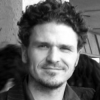Dave Eggers

Dave Eggers
Dave Eggersis an American writer, editor, and publisher. He wrote the best-selling memoir A Heartbreaking Work of Staggering Genius. He is also the founder of McSweeney's, a literary journal; the co-founder of the literacy project 826 Valencia, and a human rights nonprofit Voice of Witness, and the founder of ScholarMatch, a program that matches donors with students needing funds for college tuition. His writing has appeared in several magazines...
NationalityAmerican
ProfessionNovelist
Date of Birth12 March 1970
CityBoston, MA
CountryUnited States of America